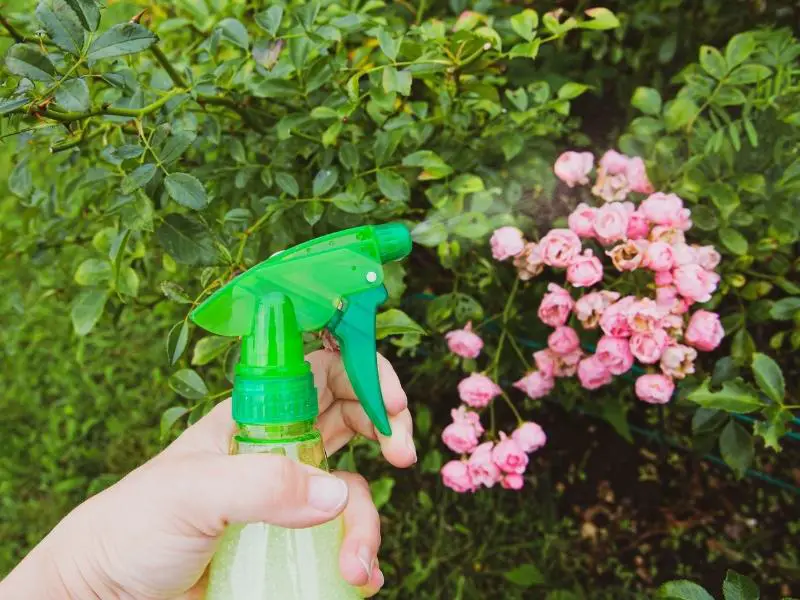
Insecticidal soap and neem oil are popular organic insecticides in the gardening world. Both insecticides are effective, but they work in different ways.
Insecticidal soap is a non-toxic soap that controls insects by suffocating them or drying out their protective coats. Neem oil has low toxicity and interferes with insects’ hormones by affecting their ability to eat, grow, and reproduce.
Neem oil combines insecticide, miticide, and fungicide in one solution, and has multiple uses. This oil is, however, riskier than insecticidal soap because of the oil’s slight toxicity and ability to burn plants if used in excess. The best insecticide for you depends on the risk level you’re comfortable with.
Insecticidal Soap Explained
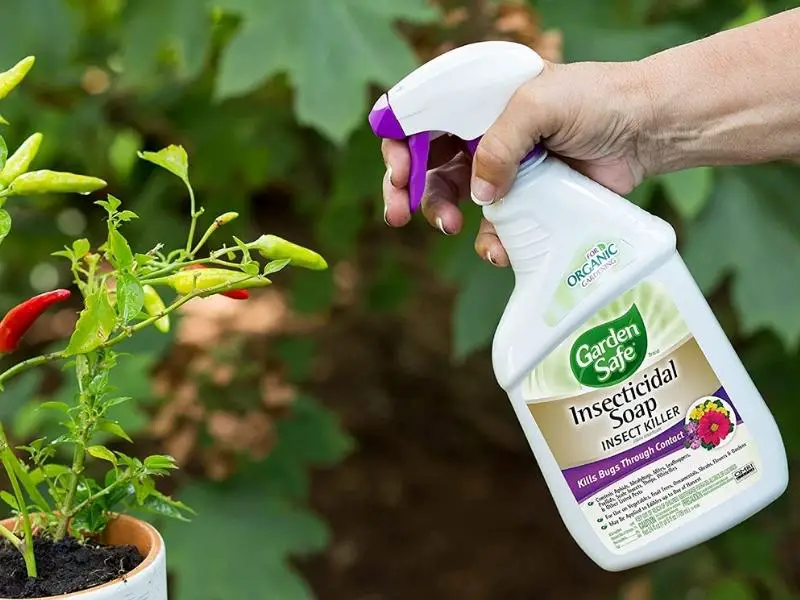
Insecticidal soap is an organic insecticide made with potassium salts from fatty acids. Gardeners use insecticidal soap to avoid pest infestations on plants. The soap successfully controls the insects without harming the plant.
Origins and Availability
Insecticidal soaps are one of the original insecticides used in the late 16th century. Later, these products fell out of use and were replaced by stronger chemical insecticides. However, insecticidal soaps are now back in fashion thanks to a growing interest in organic pest prevention methods.
Insecticidal soap is available at most gardening stores and online shops, such as Amazon, for between $10 and $20.
Ingredients and Recipe
The active ingredients in insecticidal soap are fatty acids from vegetable oils or animal fats. The insecticide is easy and relatively safe to make at home.
Homemade Insecticidal Soap Spray
- Start with a clean spray bottle — 48 ounces is the ideal size
- Select a liquid soap that doesn’t contain additives such as fragrance, moisturizer, or unnecessary chemicals. In your spray bottle, mix 5 tablespoons of the soap per 1 gallon of water
- Shake the bottle to mix the soap and water thoroughly before spraying
Optionally, add oil to the mixture to make the insecticidal soap spray more effective against insects. Mix 1 cup of oil with 1 tablespoon of liquid soap in a bottle. Shake rapidly to emulsify, then add 1 teaspoon of this base per 1 cup of water in a spray bottle to use on plants.
How to Use Insecticidal Soap
To correctly use insecticidal soap, directly spray the tops and bottoms of leaves, and any insects visible on the plant. To be effective, the insecticidal soap spray must make direct contact with the insects. Spray the solution on plants and insects every few days.
Advantages and Disadvantages of Insecticidal Soap
Insecticidal soap is an organic and eco-friendly alternative to many chemical-heavy insecticides. The soap effectively removes scale insects, earwigs, fleas, and chiggers. The soap is inexpensive and easy to make at home — making it an affordable insecticide for amateur gardeners.
Although soap sprays are less toxic than chemical alternatives to gardeners, non-pest animals, and plants, the spray can damage some particularly sensitive plants if the mixture contains oil. The safest way to use insecticidal soap sprays is by performing a patch test first.
Patch-test insecticidal spray by spraying the solution on a small section of the plant. Check for browning or wrinkling leaves in the following 24 hours. If the leaves stay healthy, use the solution on the rest of the plant.
A disadvantage of insecticidal soap is that it isn’t effective against chewing insects like beetles and caterpillars. This type of insecticide is also less effective against insect eggs.
Neem Oil Explained
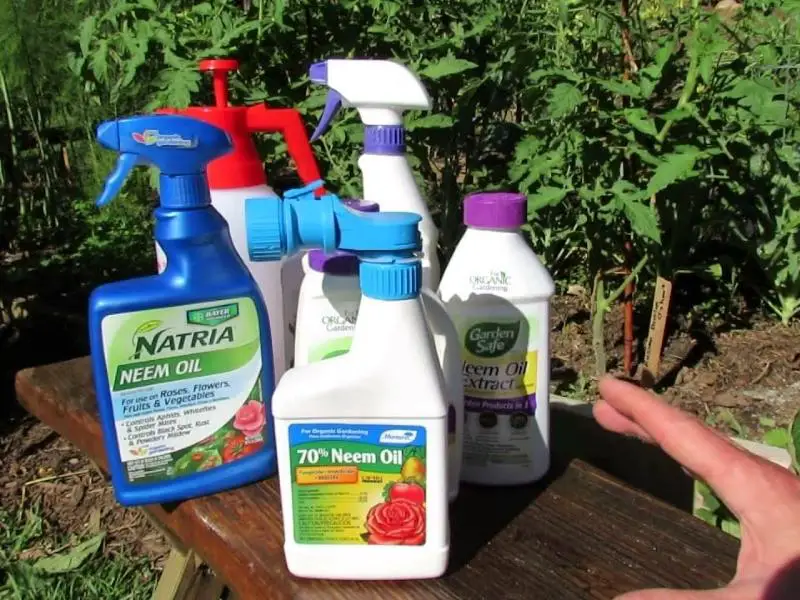
Neem oil is pressed out of neem tree seeds. This oil works as an insecticide by interfering with the life cycle of insects and preventing them from eating and reproducing properly.
Origins and Availability
Neem oil comes from Azadirachta indica, a tree that is native to South Asia. The oil has been used for centuries as a natural insecticide and as a natural ingredient in many cosmetics and medicines.
You can buy pure neem oil from health stores and neem oil insecticide sprays from gardening stores and online stores. Neem oil costs between $10 and $20.
Ingredients and Recipe
Neem oil’s active ingredient is azadirachtin, a compound that interferes with insects’ natural life cycles.
Homemade Neem Oil Spray
Neem oil insecticide spray solution is easy to make at home:
- Start with a clean, empty spray bottle and put on protective gloves to avoid any skin irritation
- You’ll need to emulsify the oil because oil and water don’t mix. To emulsify the solution, mix 1 teaspoon of dish detergent with 1 gallon of water. Then, slowly add 1–2 tablespoons of neem oil
- Mix the oil solution and water thoroughly before use
How to Use Neem Oil
Spray neem oil insecticide solution onto the tops and bottoms of all of the affected plant’s leaves. Avoid spraying neem oil on new seedlings to avoid damaging the plants. Don’t use sulfur and neem oil together.
Spray the oil solution on your plants every seven days. Although neem oil, used in small quantities, doesn’t harm beneficial insects — such as bees, butterflies, and earthworms — it’s advisable to only use the solution in the morning or evening. These are the times when these beneficial bugs aren’t pollinating.
Advantages and Disadvantages of Neem Oil
Neem oil has antifungal properties, so it’s effective as a fungicide as well as an insecticide. This oil solution helps prevent leaf spot, black spot, scab, and other common plant diseases.
Although neem oil isn’t highly toxic, ingestion of the oil or direct contact with the skin can produce adverse reactions. Oil solutions, made with an excessive amount of neem and used on plants in direct sunlight, can cause your plants to burn.
Should You Use Neem Oil or Insecticidal Soap
Both neem oil and insecticidal soap are effective and more eco-friendly than many insecticidal alternatives. If you want an insecticide, miticide, and fungicide all in one product, opt for neem oil.
If you don’t require the extra properties of neem oil and you’re worried about your plants’ leaves burning in the sunlight, opt for insecticide soap. Other eco-friendly, organic insecticides for horticulturalists include vegetable oil sprays, garlic spray, and tomato leaf spray.

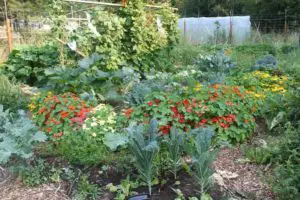
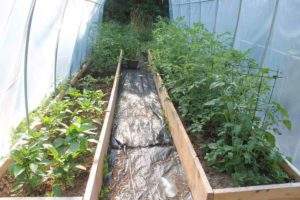
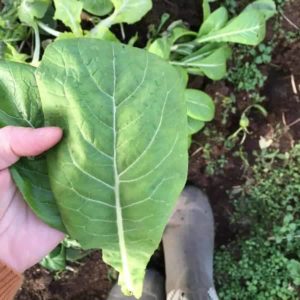

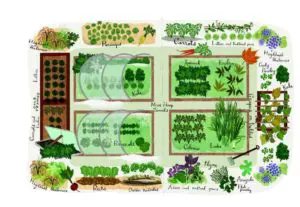
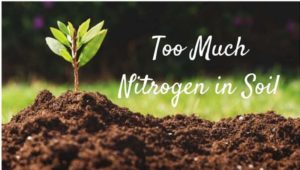
This was a very good article explaining the use of either neem oil or insecticidal soap for killing bugs on plants… In my case, I have aphids on my wavy petunias and need to eradicate them. My problem is, I have hummingbirds who love visiting the petunias (in spite of all the aphids on the flowers, leaves and stems) and I need to know if it’s safe to use a store bought 3 in one insecticidal spray on my plants (or a homemade one) without harming the hummingbirds.. hope you can answer my question. Thank you